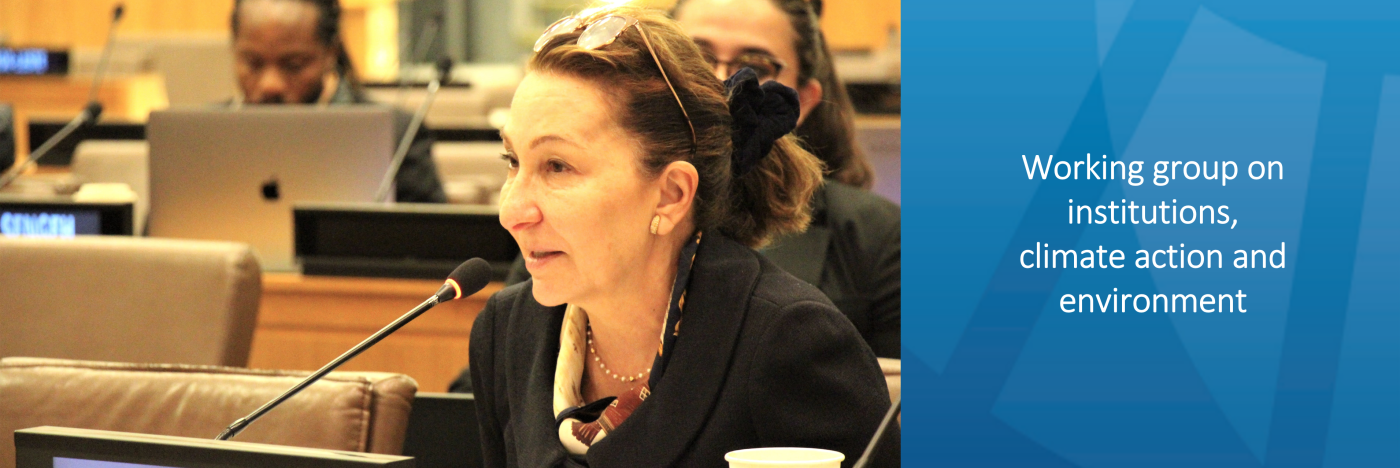Current work
Combatting climate change and protecting people and natural resources: In support of the 2025 ECOSOC cycle, the CEPA working group provided policy advice on leveraging key advances in building strong institutions and governance for climate action, focusing on clean energy transition.
Background
Climate change and biodiversity loss remain major global challenges threatening food security and human well-being worldwide. Progress towards achieving SDGs 13, 14, and 15 has stagnated or deteriorated across all regions of the world. This poor performance can be attributed to a large degree to institutional factors, such as the fragmentation of responsibility for combating climate change and for the sustainable management, protection and restoration of natural resources in many countries.
Recognizing that climate change mitigation and adaptation call for technical and programmatic shifts as well as reform of institutional structures, cultures, and capacities, the Committee decided to study the institutional challenges and opportunities related to climate action and the protection of natural resources, both on land and under water, for the first time at its 21st session (2022). In related work on public financial management, the Committee has also drawn attention to questions of public sector capacity for the effective management of sustainable public procurement at all levels.
CEPA observations and insights
- Effective governance for extreme heat: integrating institutional frameworks with the energy shift
Extreme heat and related events have become more frequent and more deadly due to the increase in global temperatures. Effective governance for extreme heat at all levels is required in response. This includes strategies to prepare for and respond to such events, and to invest in energy resilience and adaptation. Enhancing collective resilience and responding to disparate mandates across institutions requires strengthened collaboration among policymakers and regulators, as well as academia, civil society and private sector actors. (CEPA 24th session, 2025)
- Transforming the insurance industry to combat climate change-induced poverty and accelerate implementation of the 2030 Agenda
Years of large catastrophe losses due to more frequent and severe climate-related weather events have led to insurance coverage gaps in many countries, with devastating impacts for Governments and individuals, especially vulnerable groups. Increased collaboration between governments and the insurance industry is required, paired with accelerated regulation and reform, to better mitigate the risks associated with climate change. Enhancing the capacity of Governments at all levels to analyse risks, incentivize investments in resilience, prevention, and rehabilitation, and explore the development of tailored financing mechanisms, including parametric approaches to insurance, is seen as urgent. (CEPA 23rd session, 2024)
- Strengthening national and local capacities to attract climate funding
The urgent need to strengthen the global response to climate change calls for an increased focus on climate adaptation paired with expanded capacity of local and national governments to access climate finance. As a matter of priority, the provision of training and assistance to improve the skills of the governments of developing countries, and subnational authorities in particular, needs to be increased, to allow them to analyze data and design climate projects that can attract investments. (CEPA 22nd session, 2023)
- Building strong institutions to combat climate change and protect natural resources
The fragmentation of responsibility for combating climate change and the sustainable management, protection and restoration of natural resources is a major institutional barrier to achieving Sustainable Development Goals 13, 14 and 15. Governments are encouraged to prioritize mechanisms for policy coherence, including through the promotion of ecosystem management and territorial development approaches within and across administrative boundaries. Simplified regulatory frameworks and clear distribution of responsibilities across all levels of government are part of the solution, along with increased capacity in natural capital accounting. (CEPA 21st session, 2022)
- Building capacity for the effective management of sustainable public procurement at all levels
The potential of sustainable public procurement is underutilized. By leveraging public expenditure, Governments could lead by example, stimulating markets for sustainable products and services and helping steer society towards more sustainable consumption and production patterns. Market mechanisms could be used to expand procurement options but require inspection and enforcement along with the capacity in the public sector to support them. Supreme audit institutions could play a crucial role in monitoring progress at the national level and adequate legislation should be in place to do so effectively. (CEPA 20th session, 2021)
What action does ECOSOC recommend?
ECOSOC notes with concern that many Governments are insufficiently equipped to respond to extreme heat events, which are placing increasing pressure on lives, livelihoods and infrastructure in many countries, and encourages governments at the national and subnational levels to provide institutional and policy support to mitigate the effects of extreme heat and promote adaptation efforts, with an emphasis on protecting those in vulnerable situations, including women, children, older persons and displaced persons, and those residing in densely populated urban areas (ECOSOC resolution 2025/31, para.15).
ECOSOC expresses concern at the limited capacity to foresee and build resilience against the diverse challenges originating from multiple shocks in many countries, and calls for a rapid upgrade of the risk management function in government and its integration into Sustainable Development Goal-related coordination mechanisms at the highest level (ECOSOC resolution 2024/16, para. 8).
ECOSOC encourages Governments to build the capacity of the public sector in natural capital accounting based on the System of Environmental-Economic Accounting and strengthen the accountability of public institutions with regard to environmental policies by including an assessment of the state of natural resources under their jurisdiction as part of regular performance assessments (ECOSOC resolution 2023/28, para. 10).
ECOSOC recalls the need to strengthen the global response to climate change by increasing the ability of developing countries to adapt to its adverse effects, foster resilience, accelerate the full implementation of all the Goals and targets of the 2030 Agenda and integrate climate change measures, as appropriate, into national policies, strategies and planning, as well as the importance of mobilizing means of implementation from all sources, including adequate financial support, taking into account the specific needs and special circumstances of developing countries, and calls upon developed countries and the relevant international organizations and funding mechanisms to prioritize training and assistance for developing countries to improve their skills in analyzing data and designing climate projects that can attract investments (ECOSOC resolution 2023/28, para. 11).
ECOSOC notes with concern that the fragmentation of responsibility for combating climate change and for the sustainable management, protection and restoration of natural resources can be a major institutional barrier to the achievement of Sustainable Development Goals 13, 14 and 15, and encourages Governments to prioritize the establishment and strengthening of mechanisms for policy coherence to this end, inter alia, through the promotion of ecosystem management and territorial development approaches within and across administrative boundaries (ECOSOC resolution 2022/9, para. 7).
ECOSOC encourages Governments to leverage public expenditure to stimulate markets for sustainable products and services and help steer society towards more sustainable consumption and production patterns and to enhance efforts to build the requisite capacity for the effective management of sustainable public procurement at all levels (ECOSOC resolution 2021/12, para. 11).
- Technical guidance for government officials

CEPA strategy guidance note on promotion of coherent policymaking 
CEPA strategy guidance note on ecosystem management

CEPA strategy guidance note on long-term territorial planning and spatial development
- Expert papers on this topic (2016-present)

Effective governance for extreme heat: integrating institutional frameworks with the energy shift (E/C.16/2025/7, 27 January 2025)
Arabic | Chinese | English | French | Russian | Spanish
Regulating and reforming the insurance industry to combat climate change and accelerate implementation of the 2030 Agenda (E/C.16/2024/3, 1 February 2024)
Arabic | Chinese | English | French | Russian | Spanish
Public institutions and support for climate funding (E/C.16/2023/3, 12 January 2023)
Arabic | Chinese | English | French | | | | Russian | Spanish
Institutional challenges and opportunities related to climate change and the protection of natural resources (E/C.16/2022/3, 20 January 2022)
Arabic | Chinese | English | French | Russian | Spanish
Building strong institutions for addressing climate change and for the sustainable management of natural resources (conference room paper, 21 December 2021)
See also:

Sustainable public procurement in the decade of action and delivery for sustainable development (E/C.16/2021/4, 1 February 2021)
Arabic | Chinese | English | French | Russian | Spanish
- Related meetings

2022 HLPF side event: Transforming institutions to build back greener: The case for natural capital accounting (12 July 2022) (jointly organized by CEPA and UNCEEA)

Virtual expert group meeting on institutions and governance for accelerating sustainable public procurement (24 November 2020)
- Blogs by CEPA members
2024
Transforming the insurance industry to combat climate change-induced poverty and accelerate implementation of the 2030 Agenda by Linda Bilmes, Soonae Park, Mauricio Rodas, Devon Rowe, Aminata Touré and Lan Xue, Members of the Committee of Experts on Public Administration
 Welcome to the United Nations
Welcome to the United Nations
